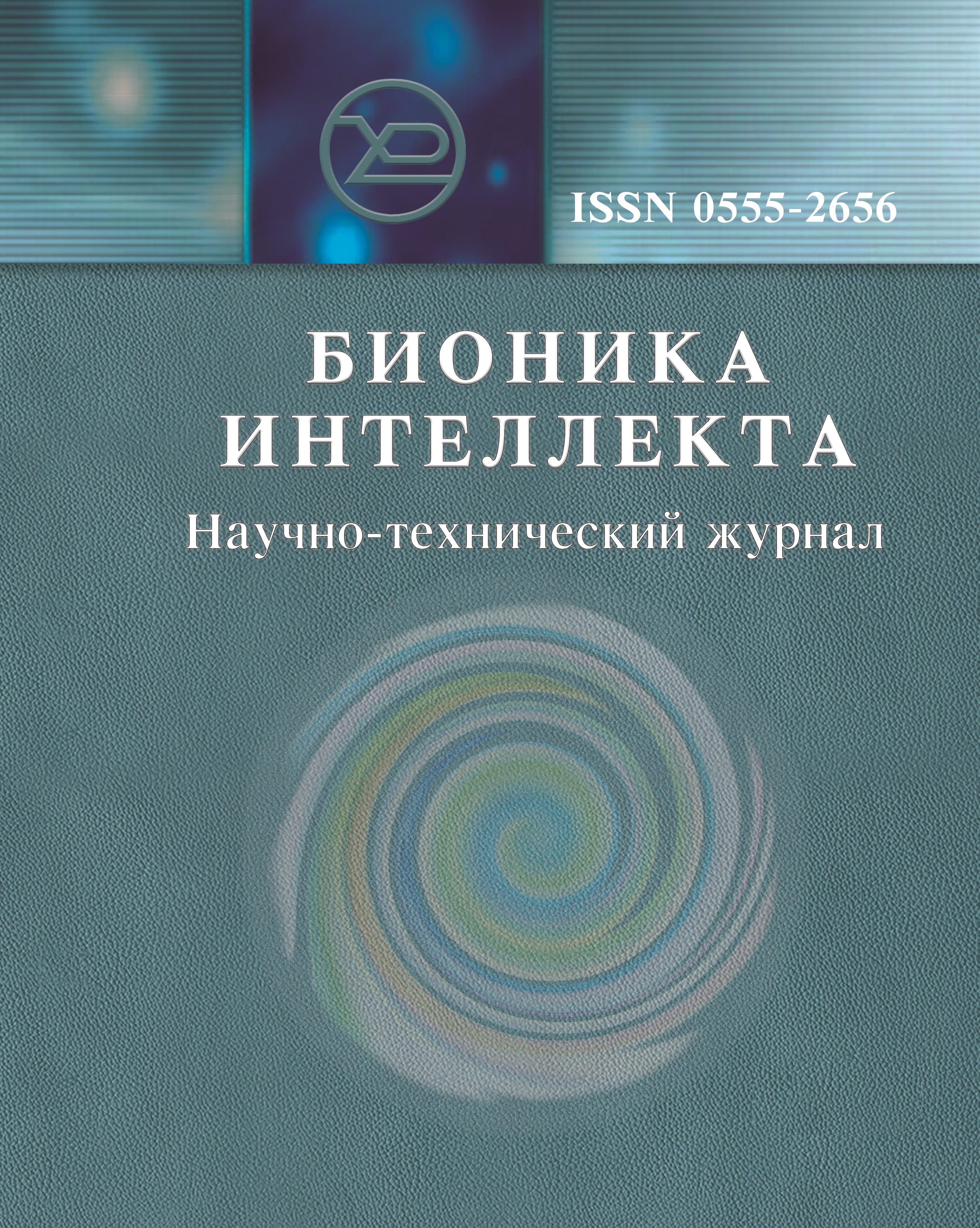Темпоральні патерни вподобань користувачів в задачах формування пояснень в рекомендаційній системі
DOI:
https://doi.org/10.30837/bi.2020.2(95).03Ключові слова:
РЕКОМЕНДАЦІЙНА СИСТЕМА, ПОЯСНЕННЯ РЕКОМЕНДАЦІЙ, ТЕМПОРАЛЬНІ ПАТЕРНИ, ІНТЕЛЕКТУАЛЬНИЙ АНАЛІЗ ПРОЦЕСІВАнотація
Розглянуто проблему врахування змін вимог користувача рекомендаційної системи при побудові пояснень
щодо рекомендацій. Ця проблема може виникнути в результаті циклічних змін вимог користувача. Її рішення
пов’язане з побудовою пояснення, що порівнює альтернативні варіанти вибору такого користувача. Розроблені
моделі темпоральних патернів складаються з множини темпоральних відношень між подіями вибору користувачами товарів та послуг. Перший патерн містить альтернативи у вигляді послідовного вибору в часі декількох
предметів або вибору тільки пари - першого і останнього предмета. Другий патерн, послідовно-альтернативного
вибору, складається з послідовності виборів у часі, яка завершується першим патерном. Запропонований підхід
до формування патернів заснований на побудові наборів даних, що містять в собі темпоральні залежності між
групою виборів користувача для заданого рівня деталізації часу. Набір даних з темпоральними залежностями
використовується для побудови темпорального графу процесу вибору користувача рекомендаційної системи.
Останній включає в себе набір темпоральних патернів із зазначенням часу їх початку і завершення, що дає
можливість визначити тривалість реалізації цих шаблонів. На основі патернів формуються підмножини темпоральних відносин для побудови пояснень щодо рекомендованого переліку товарів і послуг. Експериментальна
перевірка розробленого підходу з використанням набору даних про продажі «Online Retail» показала можливість
виділення темпоральних патернів навіть на коротких вихідних вибірках
Посилання
Aggarwal C. Recommender systems: The Textbook. – New York: Springer. – 2017. – 498 p.
Raza S., Ding C. News Recommender System Considering Temporal Dynamics and News Taxonomy // IEEE International Conference on Big Data. – 2019. – P. 920-929. doi: 10.1109/BigData47090.2019.9005459
Fararni K., Aghoutane B., Riffi J., Abdelouahed S. Comparative study on approaches of recommendation systems // Embedded Systems and Artificial Intelligence. – 2020.– P. 753-764.
Chala O., Novikov, L., Chernyshova, L. Method for detecting shilling attacks in e-commerce systems using weighted temporal rules // EUREKA: Physics and Engineering. – 2019. – Vol. 5. – P. 29-36. doi: 10.21303/2461-4262.2019.00983
Chala O., Novikov, L., Chernyshova, L. Method for detecting shilling attacks in recommendater systems using objective feedback // EUREKA: Physics and Engineering. - 2020. - Vol. 5. - P. 21-30. doi: 10.21303/2461-4262.2020.001394.
Tintarev N., Masthoff J. Evaluating the effectiveness of explanations for recommender systems // User Model User-Adap Inter. – 2012. – Vol. 22. – P. 399-439.
Zachary C. L. The mythos of model interpretability // Communications of the ACM. – 2016. – P. 1-6.
Miller T. Explanation in artificial intelligence: Insights from the social sciences // Artificial Intelligence. – 2019. – Vol. 267 . – P. 1-38. doi: 10.1109/BigData47090.2019.9005459
Tsai C., Brusilovsky P. Explaining recommendations in an interactive hybrid social recommender // Proceedings of the 24th International Conference on Intelligent User Interfaces (IUI ‘19) . – 2019. – P. 391-396.
Dominguez V., Messina P., Donoso-Guzman I., Parra D. The effect of explanations and algorithmic accuracy on visual recommender systems of artistic images // Proceedings of the 24th International Conference on Intelligent User Interfaces (IUI ‘19) . – 2019.– P. 408-416.
Nan D., Yichen W., Niao, H., Le S. Time-Sensitive Recommendation From Recurrent User Activities // Proceedings of the 28th International Conference on Neural Information Processing Systems (NIPS’15). – 2015. – Vol. 2. – P. 3492-3500.
Campos P. G., Diez F., Cantador I. Time-aware recommender systems: a comprehensive survey and analysis of existing evaluation protocols // User Modeling and User-Adapted Interaction). – 2014. – Vol. 24(2). – P. 67-119. doi: 10.1007/ s11257-012-9136-x
Ma Y., Narayanaswamy B., Lin H., Ding H. Temporalcontextual recommendation in real-time // Proceedings of the 26th ACM SIGKDD International Conference on Knowledge Discovery & Data Mining (KDD ‘20). – 2020. – P. 2291–2299. doi: 10.1145/3394486.3403278 [14] Rabiu I., Naomie S., Aminu D., Akram O. Recommender system based on temporal models: A Systematic Review // Applied Sciences. – 2020. – Vol. 10(7). – P. 2204. doi: 10.3390/app10072204
Chalyi S., Leshchynskyi V., Leshchynska, I. Method of forming recommendations using temporal constraints in a situation of cyclic cold start of the recommender system // EUREKA: Physics and Engineering. – 2019. – Vol. 4. – P. 34-40.
Chalyi S., Pribylnova I. The method of constructing recommendations online on the temporal dynamics of user interests using multilayer graph // EUREKA: Physics and Engineering. – 2019. – Vol. 3. – P. 13-19. doi: 10.21303/2461- 4262.2019.00894
Wang C., Min Z., Ma W., Liu Y. Modeling item-specific temporal dynamics of repeat consumption for recommender systems // WWW ‘19- The World Wide Web Conference. – 2019. – P. 1977–1987.
Levykin V., Chala O. Development of a method for the probabilistic inference of sequences of a business process activities to support the business process management // Eastern- European Journal of Enterprise Technologies. – 2018. – Vol. 3 (95). – P. 16-24.
Levykin, V., Chala, O. Method of determining weights of temporal rules in markov logic network for building knowledge base in information control systems // EUREKA: Physics and Engineering. – 2018. – Vol. 5. – P. 3-10.
Chalyi S., Leshchynskyi V. Method of constructing explanations for recommender systems based on the temporal dynamics of user preferences // EUREKA: Physics and Engineering. – 2020. – Vol. 3. – P. 43-50.
Chalyi S., Leshchynskyi V., Leshchynska I. Detailing explanations in the recommender system based on matching temporal knowledge // Eastern-European Journal of Eenterprise Technologies. - 2020. - Vol 4. -No 2 (106). - P. 6-13.
Thagard P. Computational Models in Science and Philosophy. Introduction to Formal Philosophy. – 2018. – P. 457-467.

